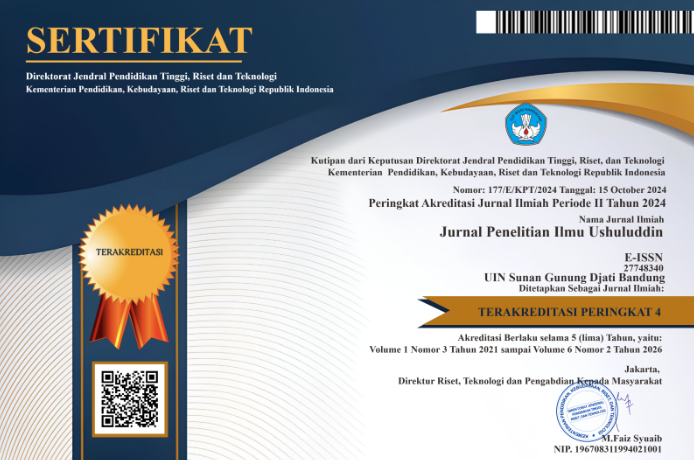Relevansi Taubat dengan Kesehatan Mental dalam Islam
DOI:
https://doi.org/10.15575/jpiu.19625Keywords:
Islam, Mental health, Psychology, Repentance, SufisAbstract
The purpose of this study is to reveal: 1) The concept of repentance according to Sufism (the Sufis) and psychology; 2) The concept of mental health according to western psychology and Sufism; and 3) The relevance of repentance to mental health according to Islam. This research belongs to the type of research (library research), using descriptive qualitative methods, and western psychological theory and the concept of repentance according to the Sufis as a knife of analysis. The findings in this study are: First, repentance according to the Sufis must be carried out solely for the sake of Allah and is determined to leave sins that have been committed in the past and not to repeat them. While repentance in the psychological view is defined as a person's encouragement to always fill himself with positive things and behaviors that direct him to foster peace of mind. Second, mental health in psychology is a psychological condition of a person in adjusting himself to his problems, whether it is within himself or outside himself by showing his abilities. Meanwhile, in Sufism's view, mental health is an ability to control mental functions, so that a good adjustment will be created, between oneself, other people, the environment, the universe or with God. Third, the relevance of repentance and mental health in Islam is the result of the process of cleansing the soul, so a mentally healthy person is a person whose soul is clean. The relationship between mental health and repentance in Islam cannot be separated, because the steps to achieve health can be produced through repentance. Repentance and mental health come from religious teachings. If the two are combined well, they can form a perfect soul, in other words, they can give birth to human beings.References
Ahyadi, A. A. (2002). Psikologi Agama Kepribadian Muslim Pancasila. Bandung: Sinar Baru.
Al-Ghazali, I. (1975). Bimbingan Untuk Mencapai Tingkatan Mukmin. Bandung: CV. Pustaka Setia.
Al-Ghazali, I. (2012). Minhajul Abidin (A. Hayadh, Penerj.). Surabaya: Mutiara Ilmu.
Al-Ghazali, M. (2010). Mukhtashar Ihya’ Ulumuddin, terj. Mujahidin Muhayan. Jakarta: Cempaka Putih.
AI-Jauziyah, I. Q. (1999). Madarijus Salikin (Pendakian Menuju Allah), Terj. Kathur Suhardi,Cet.ke-2. Jakarta: Pustaka Al-Kautsa.
Arifin, I. Z. (2009). Bimbingan Penyuluhan Islam Pengembangan Dakwah Melalui Psikoterapi Islam. Jakarta: Rajawali Pres.
Basuki, S. (2010). Metode Penelitian. Jakarta: Penaku.
Darajat, Z. (1970). Ilmu Jiwa Agama. Madura: Bulan Bintang.
Darajat, Z. (2000). Kesehatan Mental. Jakarta: Gunung Agung.
Dirgayunita, A. (2017). Kesehatan Mental dalam Perspektif Psikologi dan Islam. Jurnal Ilmu Keislaman. STAI Muhammadiyah Purbolinggo. Vol. 1, No. 1.
Freud, S. (2015). Psikologi Dalam Kehidupan Sehari-hari (Psychopatology of Everyday Life), terj. M. Sururi. Yogyakarta: Forum.
Hasanah, A. N. (2019). Hadis-hadis Keutamaan Taubat. Jakarta: el-Bukhari Institute.
Herdiansyah, H. (2010). Metode Penelitian Kualitatif untuk Ilmu-Ilmu Sosial Perspektif Konvensional dan Kontemporer (2 ed.). Jakarta: Salemba Humanika.
Jaelani, A. F. (2000). Penyucian Jiwa (Tazkiyat Al-nafs) dan Kesehatan Mental. Jakarta: Amzah.
Jalaluddin. (2015). Psikologi Agama. Jakarta: PT. RajaGrafindo.
Jaya, Y. (1995). Peranan Tobat dan Maaf dalam Membina Kesehatan Mental, Cet. Ke-3. Jakarta: Ruhama.
KemenagRI. (2022). Terjemahan Qur’an Kemenag. Jakarta: KemenagRI.
Kusnadi. & Ikhsan, M. (2022). Bimbingan Konseling Islam (Psikoterapi Taubat). Jurnal Media Intelektual Muslim dan Bimbingan Rohani. Vol. 8, No. 1.
Musnamar, T. (1992). Dasar-dasar Konseprual Bimbingan dan Konseling Islam. Yogyakarta: UIII Press.
Qodim, H. & Halim, I. A. (2017). Panduan Penulisan Skripsi. Bandung: Fakultas Ushuluddin UIN Bandung.
Rajab, K. (2010). Psiko Spiritual Islam: Sebuah Kajian Kesehatan Mental dalam Tasawuf. UIN SUSKA Riau.
Ramayulis. (2013). Psikologi Agama. Jakarta: Kalam Mulia.
Richard, S. L. & Folkman, S. (1984). Stress, Apprasial, and Coping. NewYork: Springer.
Solihin, M. (2020). Antara Tobat dan Pandemi Covid-19. Bandung: Universitas Islam Negeri Sunan Gunung Djati Bandung.
Sudarto. (1996). Metodologi Penelitian Filsafat. Jakarta: PT. RajaGrafindo Persada.
Sugiyono. (2017). Metode Penelitian Kuantitatif, Kualitatif, dan R & D. Bandung: Alfabeta.
Syukur, H. M. A. (2003). Tasawuf Kontekstual Solusi Problem Manusia Modern. Yogyakarta: Pustaka Pelajar.
Tamami. (2011). Psikologi Tasawuf. Bandung: CV. Pustaka Setia.
Thabbarah, A. A. F. (1993). Dosa-dosa Menurut Al-Qur’an, Terj. Bahrun Abu Bakar (Cet. ke-9). Jakarta: Gema Risalah Press.
Thabbarah, A. A. F. (2004). Dosa Dalam Pandangan Islam. Bandung: Risalah.
Wade, C. & Tavris, C. (2007). Psikologi. Edisi 9. Jakarta: Erlangga.
Ya’qub, H. (1992). Tingkat Ketenangan dan Kebahagiaan Mukmin (Tasawuf dan Taqarub) (cet. ke-4). Jakarta: Pustaka Atista.
Yulianti, E. R. (2017). Tobat Sebagai Terapi (Kajian Psikoterapi Islam). Syifa Al-Qulub, Vol. 1. No. 2, 132–141.
Yulianti, H. (2019). Kontribusi Agama Islam Terhadap Kesehatan Mental. Lampung: UIN Raden Intan Lampung.
Yusof, M. N. B. M. (2018). Konsep Taubat Menurut Syekh Abdul Qadir Al-Jailani. Universitas Islam Negeri Ar-Raniry Darussalam.
Yusuf, S. (2004). Mental Hygiene Pengembanagan Kesehatan Mental dalam Kajian Psikologi dan Agama. Bandung: Pustaka Bani Quraisy.
Downloads
Additional Files
Published
Issue
Section
License
Authors who publish in Jurnal Penelitian Ilmu Ushuluddin agree to the following terms:
- Authors retain copyright and grant the journal right of first publication with the work simultaneously licensed under an Attribution-ShareAlike 4.0 International (CC BY-SA 4.0) License that allows others to share the work with an acknowledgment of the work's authorship and initial publication in this journal.
- Authors are able to enter into separate, additional contractual arrangements for the non-exclusive distribution of the journal's published version of the work (e.g., post it to an institutional repository or publish it in a book), with an acknowledgment of its initial publication in this journal.
- Authors are permitted and encouraged to post their work online (e.g., in institutional repositories or on their website) prior to and during the submission process, as it can lead to productive exchanges, as well as earlier and greater citation of published work (See The Effect of Open Access).












